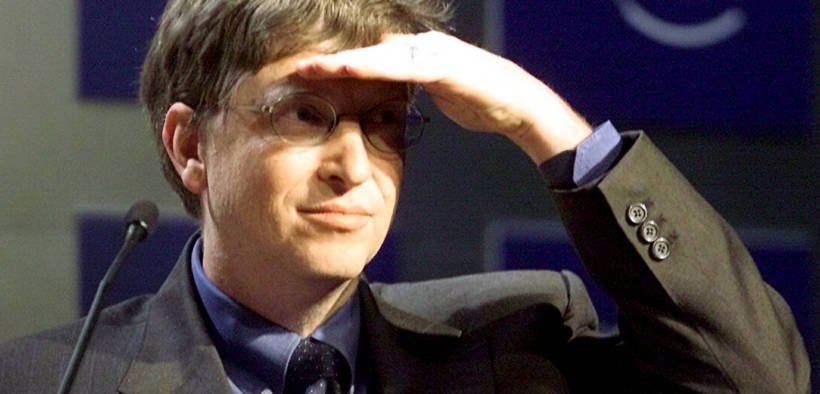Bill Gates Anticipated the Internet In 1995

At the height of the technology developed a few years earlier, Microsoft’s founder was forced to describe the phenomenon by predicting that it would change everything in the years to come in his famous memo, “The Internet Tsunami,” which is now in its 25th year.
There are mixed feelings about what Bill Gates represents socially. During his tenure at Microsoft, a computer company he co-founded with his friend Paul Allen, he was seen as an “enemy.” He didn’t arouse the emotion of another businessman, Steve Jobs, the man with the bitten apple. He did, however, make his company reach out to the world and, in any case, convinced millions of people of the need to look out another window to see the world, the computer. In recent years, having become a philanthropist, he has gained a pulse as a visionary. Twenty-five years ago, one of his memos advanced, before the “boom” that is now the importance that a thing called “Internet” was going to have, and that, at that time, was growing rapidly.
At that time, when it had not yet taken hold, Gates was forced to defend the opportunities provided by the Internet. He was going to come and change everything; he moved forward. He was defending this technology. The concept of the World Wide Web (the three famous WWWs) emerged between March 1989 and December 1990 by Englishman Tim Berners-Lee ( now embarking on a project to reformulate his idea) with the help of Belgian Robert Cailliau while they were working at CERN in Geneva, Switzerland.
In the mid-1990s, the full potential of the Internet had not yet been seen, even though 14% of Americans used the Internet at the time. The founder of Microsoft saw it clearly: “A place where people can publish information. They can have their own homepage; the companies are there, the latest information,” he went so far as to defend in an interview on the Late Show with David Letterman. It was 1995, the year of the appearance of Windows 95, one of the most successful operating systems of all time and the ecosystem with which millions of people discovered home computing.
He went so far as to say that the Internet would allow users to watch a baseball game whenever they wanted. Now, with the perspective given by time, it is obvious that the distribution of multimedia content and the phenomenon of “streaming” is unstoppable. He also commented on the importance of Artificial Intelligence, a technology that has been laying its foundations for fifty years, but which in recent years has rapidly advanced to become the new socio-economic challenge.
But a few months earlier, on May 26, 1995, 25 long years ago today, Gates sent his entire management team a memo entitled “The Tsunami of the Internet” ( PDF ). Nine intense pages are full of predictions in which he described, with hair and signs, the means that would change society and the economy as a whole in just a quarter of a century. A famous document in which he warned of the impact it was going to have on the business of the American company, which at the time trusted all its potential to the sale of Windows licenses. “In the next 20 years, the power of computers will be surpassed by exponential improvements in communications networks. The combination of these elements will have a fundamental impact on work, education, and leisure,” – Gates said at the time. “Even the CD-ROM market will be dramatically affected by the Internet” – he predicted.
The businessman, who was 39 at the time, said that “the Internet is at the forefront of all this and developments in the coming years will set the course for our industry for a long time to come.” He added: “The most important thing is that the internet has started as a place to publish content. It has enough users to benefit from a positive feedback cycle because the more users it gains, the more content it gets, and the more content it gets, the more users it increases. I encourage all executive staff members and their direct reports to use the Internet.”
“A technical challenge facing the Internet is how to handle ‘real-time’ content, specifically audio and video. The underlying technology is a packet network that does not guarantee that data will move from one point to another at an adequate speed. Network congestion determines how fast data packets are sent,” – Gates said, adding that telecommunication companies would be forced to change their communication infrastructure. But he sensed that the development would not be complete until the cable or telephone companies made “a big investment”. The entrepreneur also refers to the “born” Internet browser, Netscape. “Their browser is the dominant one, with 70% usage, which allows them to determine which network extensions will be updated,” – he explained.
Investigations for possible monopoly
This memo sounded like a recommendation, but it was more of a warning. The document resulted in the inclusion of Internet Explorer, the web browser of Windows, which would lead to a decade of litigation and investigations by the competent authorities anticipating monopolistic practices. The U.S. government sued Microsoft in 1998 for unfair competition. Following this complaint, the company was forced to launch a version of Windows 95 without its popular Internet browser.
Phrases such as “the Internet is going to be crucial for every part of our business” or “it is the most important development that has emerged since the introduction of the IBM PC in 1981” only proved the businessman right in his attempt to design a business strategy by which he could get Microsoft not only to enter the Net but to dominate it.







